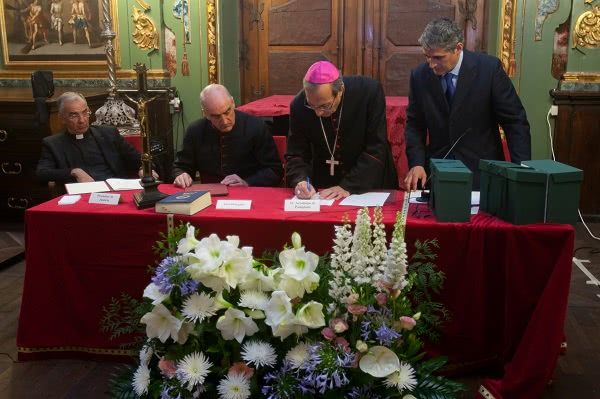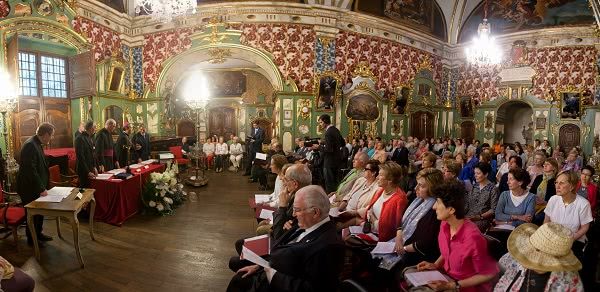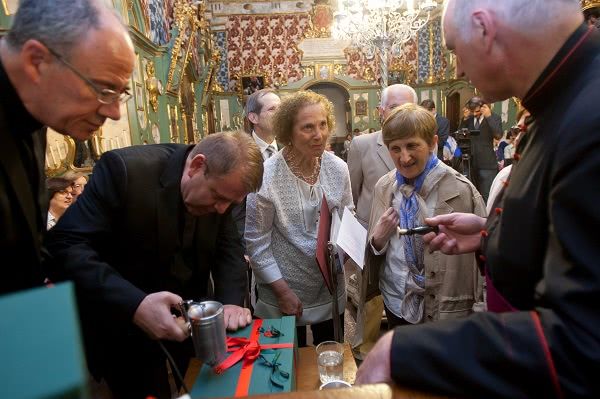On December 11, 1998, after the required preliminary proceedings, the Archbishop of Pamplona opened the Cause of Canonization, and the first session of the diocesan process on Dr. Eduardo’s life, virtues and reputation for sanctity was held.
The diocesan process was completed on May 28, 2002, and an authenticated copy was sent to the Congregation for the Causes of Saints.
The Congregation for the Causes of Saints is studying the Positio super vita et virtutibus.
**********************************************
“The uniting of the canonization causes of the Ortiz de Landázari-Busca couple is a love song. When two people marry, they give themselves to each other. That they are now united on their path to sainthood speaks to us of a love that is eternal,” says Ines Escauriaza, who is married and has three young children.
Ines was present on June 22, 2015 for the closing of the diocesan phase of the Process of Canonization of the servant of God, Laura Busca. Laura is the wife of Eduardo Ortiz de Landázuri, a prestigious doctor who helped begin the University of Navarra Hospital, and who has also been declared a servant of God. The diocesan phase of Eduardo’s process was formally completed in the archdiocese of Pamplona on May 28, 2002. Both husband and wife were faithful of the Prelature of Opus Dei.
“To hear about lives like these fills young couples like us with hope,” Ines says. “It may seem idealistic in our society, but a love that lasts forever, all the way to heaven, is real and can be achieved. It takes three to make a Christian marriage—the woman, her husband, and God. The matrimonial path is one of love and self-giving, like that of Christ. Laura and Eduardo followed that path faithfully and we can have recourse to their intercession to do so ourselves.”

The act of closure took place in the sacristy of the Cathedral of Pamplona, with Archbishop Francisco Perez presiding. Family members and friends were present, along with other married couples who wanted to thank Eduardo and Laura for their example of love, fidelity, self-giving and joy in married life.
During the closing ceremony the Archbishop said: “John Paul II called St. Josemaria ‘the saint of the ordinary.’ Today we pause to remember a faithful of the Prelature of Opus Dei who followed the path opened by the founder, seeking holiness in the ordinary daily activities of a Christian mother and spouse.”

The boxes containing the documentary materials and personal testimonies assembled by the tribunal since September 2012 were sealed and will be sent on to the Congregation for the Causes of Saints for further study. From this moment on, the two Causes of Canonization are united in the private devotion of the Christian faithful as the Cause of Canonization of the Ortiz de Landázuri-Busca married couple.
Laura Busca was born on November 3, 1912 in Zumarraga, Guipuzcoa, Spain. She earned a degree in pharmacy at the Central University of Madrid in 1935. Her doctoral thesis on typhus was researched at the King’s Hospital, where she met Eduardo. After the traumatic years of the Spanish civil war, they were married on June 17, 1941, and eventually had seven children. Laura, who dedicated herself full time to her family, asked for admission to Opus Dei as a Supernumerary in 1953.
“What strikes me in reading about her life is her professional profile. Only five percent of the women of her time had such an advanced education,” says Beatriz Castillo, who was present at the ceremony and has a doctorate in law. Like Laura and Eduardo, she is married and has seven children. Six in this world and one in heaven, who died shortly after birth. Javier, who is nine, is autistic. “When I think about Laura’s life, I admire the priority she gave to her family. Sometimes I have trouble fitting everything together in my own life. My professional life has been quite demanding and has forced me to make certain choices in life. Laura understood clearly that she had to help her husband raise a large family, and this is an inspiration for me.”
Maria Calatrava, a psychology teacher who is married and has four children, made a similar observation. “Laura had a privileged intellect, and could have been outstanding in her profession. I entrust to her my problems in reconciling my family and my work; she helps me to grasp at each moment what my priorities should be.”

Beatriz, in turn, is encouraged by the fact that Eduardito, Laura’s oldest child, suffered from a disability. “Sometimes I experience little momentary rebellions in my heart, and fail to see each situation as an opportunity for holiness. Laura too had a disabled child, and therefore she seems very close to me. She teaches me that my disabled son is a treasure who helps our whole family on our path to heaven.”
Beatriz has placed in Laura’s hands the future of her autistic son Javier, and her husband has entrusted the same intention to Eduardo. “Every day my husband says the prayer card. For us parents, the future of a child with disabilities is a deep concern, especially when we will no longer be able to be there for them. We notice the help of Laura and Eduardo in our daily life at home. Our family has been renewed, and we are all receiving a special grace to improve, to be more united, and to love each other more.”
Laura led a normal life, extraordinarily normal, full of small acts of love. This fills Ines with hope: “Knowing that we don’t have to perform great deeds, that in the little things of each day we can attain sanctity, is very encouraging. Laura was always smiling, treating others with great affection, sacrificing herself without calling attention to it, suffering in silence. And she was a Basque, like me. So even we Basques can be saints.”
The closing of the diocesan phase and the joining of the two Causes takes on special relevance in light of the Synod on the Family the universal Church will hold this fall.
Up to now there have been two beatifications of married couples: Luis and Maria Beltrame Quattrochi (2001) and the parents of St. Thérèse of the Child Jesus, Louis Martin and Zélie Guérin (2008). Due to the impulse of John Paul II, more Causes of married couples are now in various stages. These include Manuel Casenoves and Adela Soldevila, in Valencia, Spain; Fernando Crespo and Maria de Miguel, in Leon, Spain; and the Balmoris, in Mexico. And also that of the Alvira Dominguez couple in Madrid, who also were faithful of the Prelature of Opus Dei.

“Laura and Eduardo were a school of married life,” says Maria Calatrava, “beginning with their refined and affectionate courtship. In their married life, they were an example of love filled with deep respect for one another, never arguing in front of the children, for example. When children see this model of love in their parents, they grow up wanting to imitate it in their own lives.”
Beatriz sees things from the perspective gained from her thirteen years of marriage: “By now we realize that things aren’t always going to be easy. Unfortunately, some couples never come to terms with this. When you are surrounded by diapers and crying babies, the danger is that you seek an escape outside the home, for example, in social life and professional accomplishments. And what you really need to do is to cut back your pride, to see things from the other person’s viewpoint, to rise above small annoyances. This is charity in its fullest sense, real Love.”
Beatriz continues: “Laura and Eduardo always showed great understanding for one another. They learned from St. Josemaria that they had to love each other with their defects, not thinking only of themselves but of what was good for the whole family. The unity of a family is a treasure that can never be placed in danger. When the warm feelings are no longer there, when as the years go by the husband and wife discover each other’s defects, that is when they need to reaffirm their decision to love, for their own good and for the good of the children. Children with parents who are closely united have won half the battle of growing up. When you see the example of a married couple like Laura and Eduardo, you realize how worthwhile it is to struggle to achieve that unity.”
Photo gallery of Laura Busca's life
Information about Eduardo Ortiz de Landazuri's Cause of Canonization